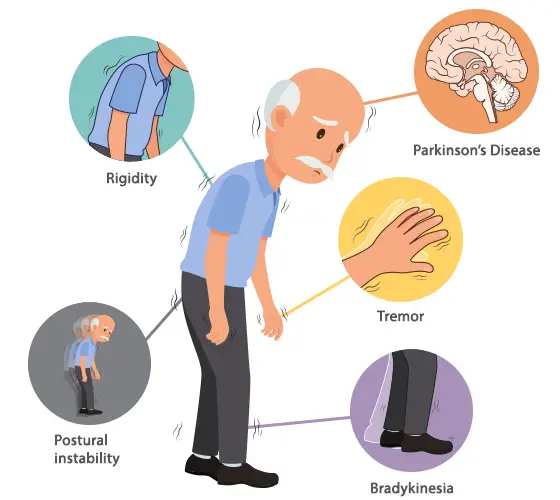Contact Us
We are here for you! Book you Physiotherapy Appointment by choosing one of the following option below
Write to us
Appointment@rcphealth.ca
Choose time slot
that work for you
Parkinson’s disease is a progressive neurological disorder affecting individuals in Oakville and nearby areas. Symptoms, such as tremors, stiffness, and speech difficulties, develop gradually and worsen over time. Patients may also experience behavioral changes, depression, memory loss, and fatigue. While the exact cause of Parkinson’s remains unclear, experts believe a combination of hereditary and environmental factors play a significant role, making it essential for those in Oakville to seek personalized care and support.

The substantia nigra, a brain region, loses nerve cells in Parkinson’s disease, leading to a decrease in dopamine levels crucial for controlling body movements. While there is no cure for Parkinson’s yet, treatment options such as medication, physiotherapy, and surgical interventions can help manage symptoms effectively.
Individuals in Oakville and surrounding areas can find specialized care and resources tailored to Parkinson’s management. Stay informed about the latest research and advancements in Parkinson’s treatment options available near you.
Although Parkinson’s has four main symptoms, early symptoms may differ from one person to another. Many at times, the signs are mild and can go unnoticed. The main symptoms include tremors in hand, arms or head, Muscle stiffness, Difficulty with movement, and speech changes. In addition, person suffering from Parkins’s Disease may experience:
. Muscle stiffness or rigidity in the limbs most frequently in the arms, shoulders, or neck.
. Gradual loss of spontaneity often results in mental decline or slowed reaction times, voice changes, altered facial expressions, etc.
. One of the more frequent symptoms of Parkinson’s disease is a loss of smell called Hyposmia. A condition that is known as olfactory dysfunction.
. Trouble Sleeping
. Patients may walk slowly or with dragged-out gaits. This is often described as a “shuffling gait.” The individual may suddenly walk quicker or ..slower or alter their stride length as they move along.
. Improper posture. A hunched-over, flexed position with elbows, knees, and hips bent.
. Loss of balance or unsteadiness
. The gastrointestinal system frequently experiences disturbances. Parkinson’s disease may delay the digestive tract’s automatic movement, ..leading to recurrent constipation.
. Dementia or Depression
Parkinson’s disease can be brought on by a confluence of genetic, environmental, and lifestyle factors. The interaction of these three factors determines Parkinson’s disease development. The substantia nigra, a brain region, loses nerve cells, resulting in Parkinson’s disease. Dopamine is a neurotransmitter that is made by nerve cells in this region of the brain. Dopamine levels in the brain decrease if these nerve cells perish or suffer injury resulting in slow or difficulty with movements.
Environment. Though not very prevalent, the risk of Parkinson’s Disease may increase due to environment conditions. Exposure to toxics like metals, pesticides, solvents, and other contaminants, and other environmental risk factors may increase the risk of Parkinson’s Disease.
Genetics. Over time, researchers have compared the genes of Parkinson’s patients and found specific gene mutations that can cause Parkinson’s Disease.
Past traumatic brain injury. A head trauma sustained while playing contact sports or due to a motor vehicle accident may raise the likelihood of the illness.
While physiotherapy cannot cure Parkinson’s disease, it can play a significant role in managing its symptoms and improving overall quality of life for individuals living with the condition. Physiotherapy focuses on enhancing mobility, flexibility, balance, and strength, which can help alleviate some of the motor symptoms associated with Parkinson’s, such as tremors, stiffness, and difficulty with movement.
Since Parkinson’s is an inflammatory condition, scientists have devoted a lot of work to studying the anti-inflammatory benefits of omega-3 fatty acids on the situation. The benefits of omega-3 fatty acids go beyond preventing Parkinson’s disease; they are significantly associated with preventing cell death and degeneration.
Physiotherapy interventions may include exercises tailored to address specific motor symptoms, gait training, balance training, stretching, and manual therapy techniques. Additionally, physiotherapists can provide education and guidance on strategies to manage symptoms in daily life, improve posture, and prevent falls.
Write to us
Appointment@rcphealth.ca
Choose time slot
that work for you
Early implementation of the program should be undertaken to prevent deconditioning and other preventable complications. The therapist at RCP health will identify deterioration and implement appropriate intervention. This provides the therapist an opportunity for targeted therapy for restoration or compensation of function.
Particular consideration is given to:
– Gait re-education, improvement of balance and flexibility
– Enhancement of aerobic capacity
– Improvement of movement initiation
– Improvement of functional independence, including mobility and activities of daily living
– Advice regarding safety in the home environment.
The Therapist will assess, monitor, treat & manage the condition. They will decide the treatment location (At-home or in-clinic) and plan goals jointly. they will make sure that the family / carer is aware of the treatment plan and updated on progress in a timely fashion.
The Physiotherapist can help chose the right assistive device They will also ensure that the device is the correct size and proper training on how to use it is provided. The assistive devices may include
Physiotherapy for patients with Parkinson’s should begin as early as possible. it can also be initiated at any stage through the course of the disease but clarity on the goals i.e. rehabilitation goals, maintenance, or palliatives should be set beforehand.
If you need any information or have any questions related to the treatment, please feel free call us at 1.888.332.7372 to book a free consultation session with our physiotherapist.
Check out our resources section for more information on topics like health, lifestyle, rehabilitation, and many more.